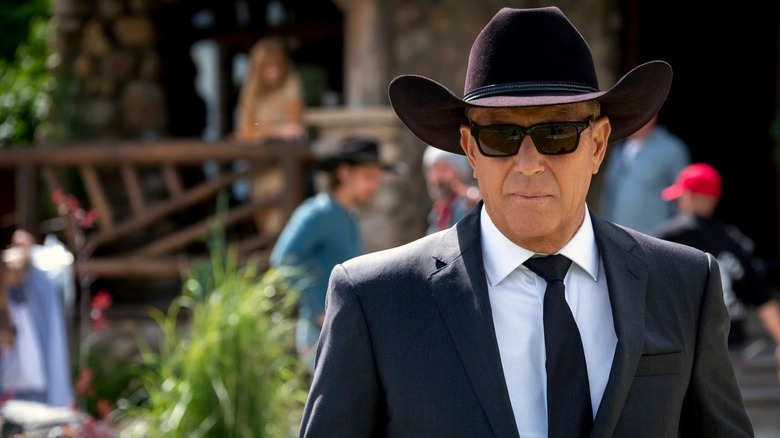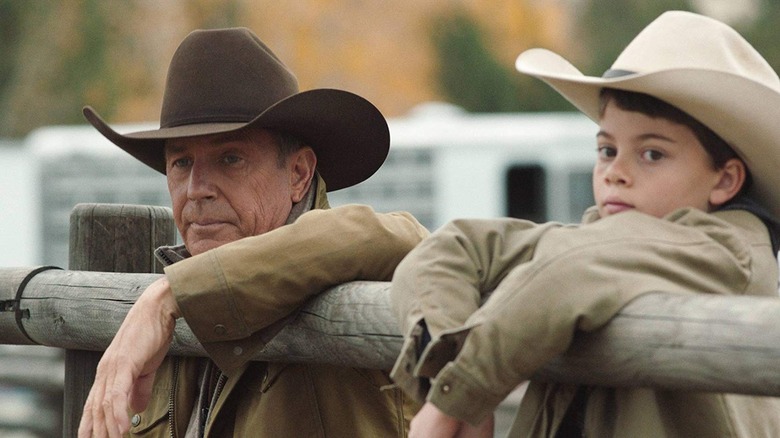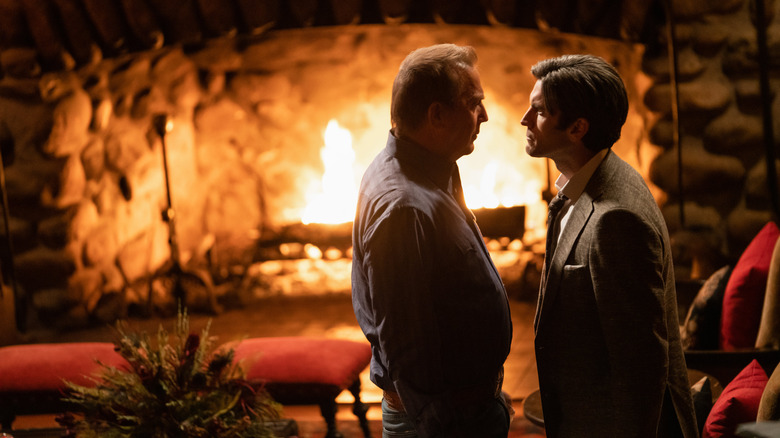Why Taylor Sheridan Refuses To Hire A Writers' Room For Yellowstone
Name-drop Taylor Sheridan online and you're bound to get a chorus of jokes about cowboys and shows your dad watches from his non-fans. His series like "Yellowstone," "Mayor of Kingstown," and "Tulsa King" are often punching bags for critics, too, who love to crack wise about their oats opera storylines and pedestrian tough guy antics. They also tend to do gangbusters business in terms of viewership, presenting themselves as a Middle-American alternative to HBO's high-art prestige dramas or the nerdy franchises that tend to dominate discourse around the water cooler. (Water cooler chats are still an actual thing we do, right?)
A major part of the reason people tend to have uniform opinions about Sheridan's TV series is that he writes most of them almost completely by himself. But that wasn't his original intention back when the "Veronica Mars" and "Sons of Anarchy" alum stepped away from acting to focus exclusively on working behind the camera. "The plan was I would Greg Berlanti it," Sheridan told The Hollywood Reporter, alluding to the chief creative who oversaw The CW's now-defunct DC television universe (also known as the Arrowverse). "I would write, cast and direct the pilots, and then we would bring in someone as a showrunner to run a writers room and I could check in and guide them."
So, what changed? "That plan failed," he said. "There were some things that none of us foresaw."
'So for me, writers rooms, they haven't worked'
The notion that an individual writer can pen an entire show and maintain quality control is one that greedy studios have been all too eager to endorse in the streaming era. But collaboration has always been the name of the game when it comes to writing half-decent television, no matter how much we might sing the praises of any individual storyteller. (For example, as "Buffy the Vampire Slayer" fans would gladly tell you, there was always more to the show than Joss Whedon.) In fact, studios attempting to cut down on costs by hiring as few writers for as little time as possible is one of the primary causes of the ongoing writers' strike.
In that light, it's hard not to side-eye Taylor Sheridan's explanation for why he writes "Yellowstone" by himself:
"My stories have a very simple plot that is driven by the characters as opposed to characters driven by a plot — the antithesis of the way television is normally modeled. I'm really interested in the dirty of the relationships in literally every scene. But when you hire a room that may not be motivated by those same qualities — and a writer always wants to take ownership of something they're writing — and I give this directive and they're not feeling it, then they're going to come up with their own qualities. So for me, writers rooms, they haven't worked."
Call me clueless, but hasn't getting to really explore "the dirty of the relationships" between characters always been the reason to tell a story through the long form of television rather than film? Even a show as old as "Star Trek: The Original Series" was arguably more about Kirk's dynamic with his crew than their weekly adventures.
'There is no compromising'
To be fair to him, Taylor Sheridan doesn't seem remotely interested in kowtowing to studio executives who view writers as disposable gig workers (as opposed to, you know, the people essential to creating their "content"). Quite the opposite, as he explained to THR:
"I spent the first 37 years of my life compromising. When I quit acting, I decided that I am going to tell my stories my way, period. If you don't want me to tell them, fine. Give them back and I'll find someone who does — or I won't, and then I'll read them in some freaking dinner theater. But I won't compromise. There is no compromising."
Later in the interview, Sheridan reiterated that his approach is all about telling the stories he wants to tell, exactly the way he wants to tell them:
"The freedom of the artist to create must be unfettered. If they tell me, 'You're going to have to write a check for $540,000 to four people to sit in a room that you never have to meet,' then that's between the studio and the guild. But if I have to check in creatively with others for a story I've wholly built in my brain, that would probably be the end of me telling TV stories."
While I understand what Sheridan is getting at, I can also tell you that great writing will always stem from collaboration. Even writers like myself are dependent on our editors to ensure we don't accidentally shoot ourselves in the foot. There's no denying Sheridan's approach has brought him immense financial success and plenty of people love his shows just the way they are. But maybe, just maybe, he's managed to build his television empire despite this lack of artistic cooperation, not because of it? Just throwing it out there.


